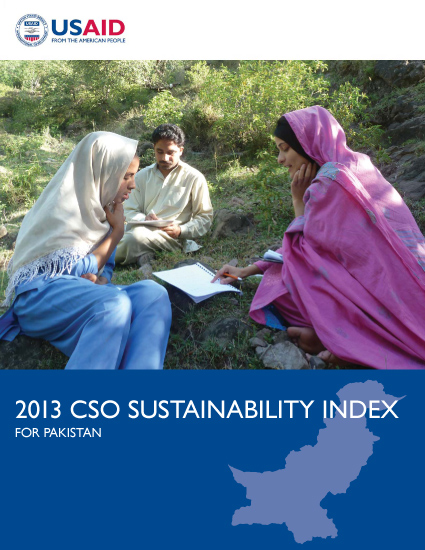- What We Do
- Agriculture and Food Security
- Democracy, Human Rights and Governance
- Democracy, Human Rights and Governance Strategy
- Supporting Free and Fair Elections
- Supporting Vibrant Civil Society & Independent Media
- Protecting Human Rights
- Promoting Accountability & Transparency
- Importance of Democracy, Human Rights, & Governance to Development
- Countering Trafficking in Persons
- Economic Growth and Trade
- Education
- Ending Extreme Poverty
- Environment and Global Climate Change
- Gender Equality and Women's Empowerment
- Global Health
- Water and Sanitation
- Working in Crises and Conflict
- U.S. Global Development Lab
Background
2013 CSO Sustainability Index (CSOSI) for Pakistan ![]() (pdf - 592k)
(pdf - 592k)
The 2013 CSO Sustainability Index (CSOSI) for Pakistan looks at the sustainability of the civil society sector based on an assessment by local civil society representatives and experts. The CSOSI is an important tool for civil society organizations (CSOs), governments, donors and academics for understanding and measuring the sustainability of the CSO sector. This publication complements other editions of the CSOSI which together cover over sixty countries and territories in Central and Eastern Europe and Eurasia, Sub-Saharan Africa, the Middle East and North Africa, and Afghanistan.
Approach
The Index assesses seven interrelated dimensions of CSO sustainability: Legal Environment, Organizational Capacity, Financial Viability, Advocacy, Service Provision, Infrastructure, and Public Image. These scores are averaged to produce an overall score for CSO Sustainability. Details of the methodology can be found here.
Findings
Civil society in Pakistan encompasses a range of organizations focused on education, health, emergency services, gender rights, and a variety of other areas, and displaying a wide range of capacities and resources. CSOs can register under multiple laws and ordinances and operate under a favorable tax regime. In 2013, the draft Regulation of Foreign Contributions Act 2013, was introduced. This Act aims to increase the transparency of foreign-funded NGOs but may allow greater government control of them. CSOs continued to face a particularly difficult operating environment in Khyber Pakhtunkhwa (KPK) and Balochistan.
The organizational capacity of CSOs in Pakistan tends to vary according to the size of the organization, and whether it is based in an urban or rural location. Management, staffing and human resource development remain difficult for most CSOs, with the exception of some large organizations. The sector continued to shift towards project-based work, creating challenges for constituency building and strategic planning. With the proliferation of social media and affordable technology in the country, most CSOs have modernized their ICTs, and are beginning to use mobile technologies. Many large, national-level CSOs—particularly those working on rights-based issues and advocacy—rely largely on foreign donor funding, while local charitable, philanthropic, and faith-based organizations generally have a large support base of individual donors and receive significant funding through religious-based donations. CSOs have not been very successful in implementing income-generating activities or obtaining government funding. A number of urban-based Intermediary Support Organizations (ISOs) provide networking platforms, information technology support, and capacity building services.
CSOs had some success in building networks and conducting issue-based campaigns, such as on a Right to Information Law in 2013. CSOs also engaged in the electoral process, especially on voter education, election monitoring, and support to the Election Commission of Pakistan (ECP). CSOs continued to provide a diverse range of services, ranging from basic services, such as health, education, and emergency relief, to more advanced areas such as research and development and capacity building.








Comment
Make a general inquiry or suggest an improvement.